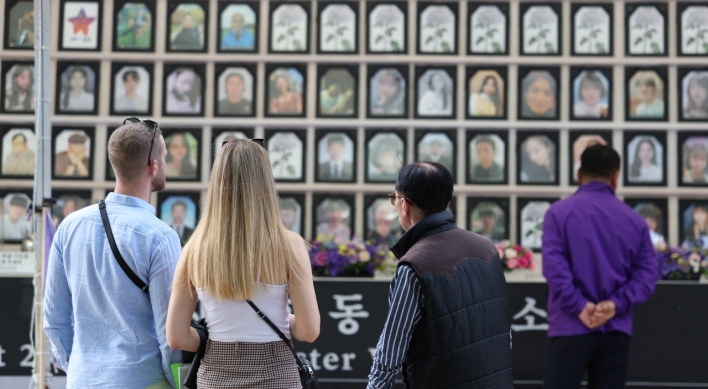N.K. nuclear arms program now a ‘real threat,’ Seoul says
By Korea HeraldPublished : Sept. 3, 2013 - 20:20
North Korea has made considerable progress in developing a fairly robust nuclear program in the past three years and is capable of making atomic weapons at any time, Seoul’s defense ministry said Tuesday.
“North Korea’s nuclear program remained at a developmental and experimental stage in 2010, but it has grown into a real threat in 2013, and it is able to make a nuclear device at any time,” the ministry said in a report to the parliamentary defense committee.
“China’s changing attitude toward North Korea proves the seriousness of (its nuclear program).”
“North Korea’s nuclear program remained at a developmental and experimental stage in 2010, but it has grown into a real threat in 2013, and it is able to make a nuclear device at any time,” the ministry said in a report to the parliamentary defense committee.
“China’s changing attitude toward North Korea proves the seriousness of (its nuclear program).”

Tensions escalated between the two Koreas when Pyongyang in December fired a long-range rocket, which was deemed as a covert test of its ballistic missile technology, and then in February conducted its third atomic test. Both actions invited additional U.N. Security Council sanctions against the impoverished nation.
In April, the North announced that its nuclear scientists will begin work on restarting a uranium enrichment plant and a 5-megawatt reactor in the Yongbyon complex.
“North Korea is preparing to resume its nuclear facility in Yongbyon and continues to develop missiles,” it said. “The South Korean military needs to beef up deterrence capabilities against a worsening North Korean threat.”
Amid inter-Korean talks to resume cross-border projects, Pyongyang expressed its willingness to rejoin the six-party talks but has shown no signs of accepting conditions set by Seoul and Washington to give up its nuclear capabilities. Instead, it has insisted on being recognized as a nuclear power.
As the communist country has enhanced its missile and nuclear capacity, it is more likely that the North could misjudge the security situation on the Korean Peninsula if Seoul regains its wartime operational control from Washington in December 2015, the ministry said.
The remark comes as South Korean and U.S. officials have been trying to decide whether the two sides need to reschedule the transition, and if so, under what condition it should be done.
During last week’s ASEAN meeting in Brunei, the two nations’ defense chiefs met to further discuss the matter on how to handle growing North Korean threats and decide on the appropriate timing of the transfer.
“There is a consensus that the December 2015 deadline is not appropriate for Seoul to regain the wartime control,” Defense Minister Kim Kwan-jin told lawmakers during the parliamentary committee meeting.
“Currently, the ministry is discussing with its American counterpart (over the postponement) in accordance with the current security situation.”
Seoul’s regaining operational control of its troops in the event of war is still a politically and ideologically controversial issue, as the two Koreas still remain technically at war after the 1950-53 Korean War ended in a truce.
South Korea handed over its operational control to the U.S.-led U.N. troops during the three-year conflict and regained peacetime OPCON in 1994. (Yonhap News)
-
Articles by Korea Herald







![[Music in drama] Rekindle a love that slipped through your fingers](http://res.heraldm.com/phpwas/restmb_idxmake.php?idx=644&simg=/content/image/2024/05/01/20240501050484_0.jpg&u=20240501151646)



![[New faces of Assembly] Architect behind ‘audacious initiative’ believes in denuclearized North Korea](http://res.heraldm.com/phpwas/restmb_idxmake.php?idx=644&simg=/content/image/2024/05/01/20240501050627_0.jpg&u=20240502093000)







